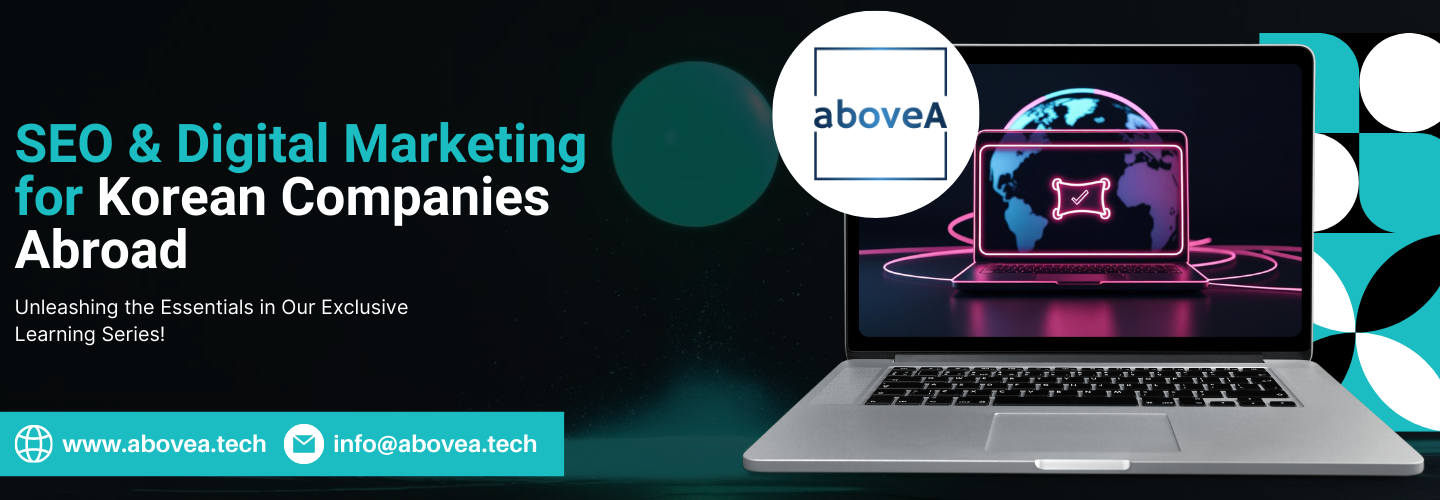

Karina Kavaleuskaya
She combines a passion for storytelling with a strategic mindset to help brands grow, stand out, and connect deeply with their audiences. Through thoughtful, impactful writing, she turns complex ideas into clear, engaging narratives that drive results.
Global Growth with SEO: Korean Companies Going Abroad
Global SEO for Korean brands is now the key to successful international growth. Inside South Korea, Naver dominates search, but once companies step abroad, Google, Bing, and other platforms take over. Strategies that work at home no longer deliver results overseas. This article explains how Korean companies ‘ digital marketing abroad must adapt to compete globally.
We’ll cover the transition from Naver SEO to international search engines, building a strong digital presence, creating global SEO strategies, and using digital marketing channels like paid ads, social media, and PR. By the end, Korean businesses will know precisely how to build visibility and trust worldwide.
Ready to Take Your Korean Brand Global?
Table of Contents
Building International Digital Presence
Digital presence for Korean companies abroad is the first step toward credibility in new markets. In Korea, Naver’s visibility and local recognition are enough, but overseas, buyers expect more. A professional website in English or the local language, a mobile-friendly design, and precise product details are now essential.
Trust also depends on external proof. Reviews on platforms like Trustpilot or Amazon, combined with active social media profiles, reassure buyers that the brand is reliable. Without these signals, even strong products face hesitation.
To expand abroad, Korean digital marketing, tailoring online presence to local habits, is critical. U.S. customers rely on Google searches, Europeans value sustainability messaging, and Southeast Asians expect mobile-first platforms. By aligning with these expectations, global visibility for Korean businesses becomes achievable. Digital presence is not only about being seen – it is about being chosen.
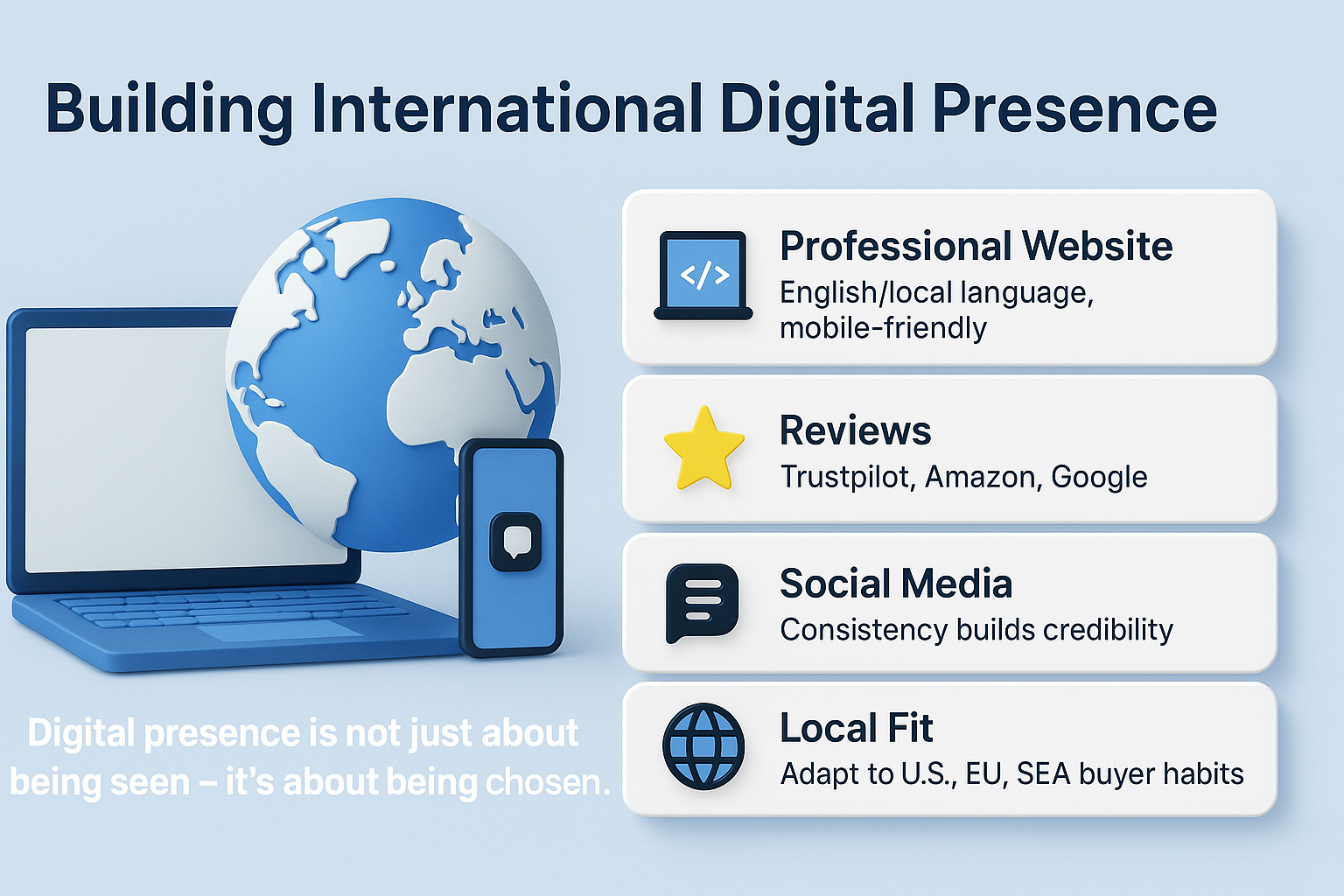
Global SEO Strategy for Korean Brands
Global SEO strategy for Korean brands is what transforms visibility into long-term growth abroad. A strong product and digital presence are not enough if buyers cannot discover the brand on Google or Bing. For South Korean companies, adapting SEO to international search engines is one of the most critical steps in their expansion roadmap.
Core Elements of International SEO
For international SEO Korean companies, success depends on three layers: technical SEO, content optimization, and authority building. Each one supports the others, creating a complete system for visibility.
Key components include:
Technical SEO – mobile-first websites, structured data, fast page speed.
Content optimization – keyword-rich articles in English and target languages.
Authority building – backlinks from trusted websites, industry media, and local partners.
When combined, these elements help expand abroad Korea search optimization into a reliable growth engine.
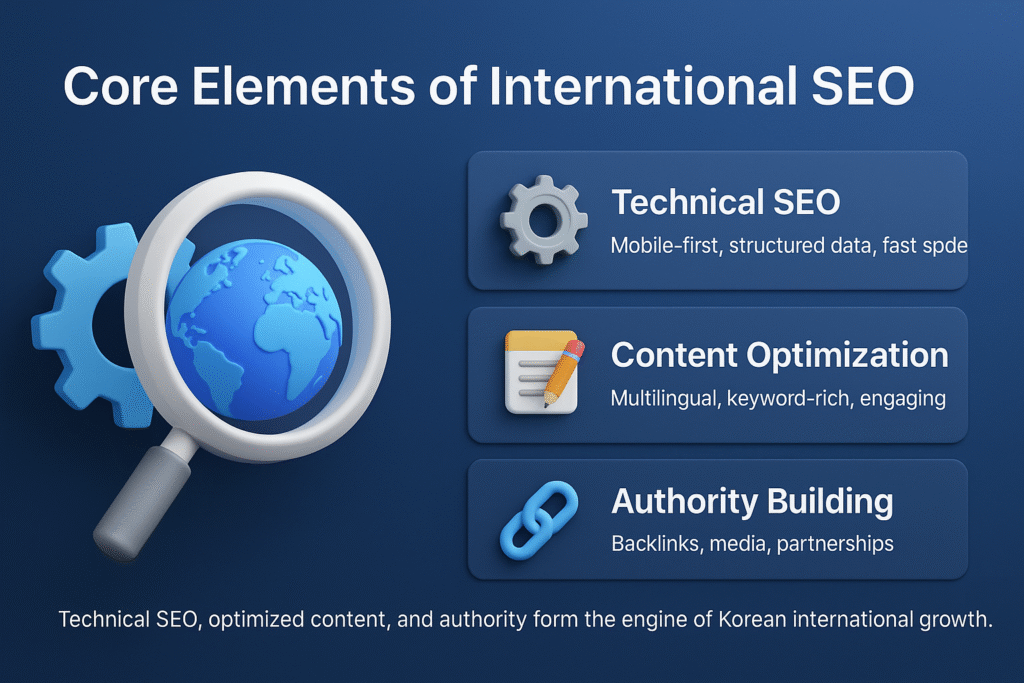
Comparing Domestic vs. Global SEO
Korean companies often assume their Naver strategies will work abroad, but ranking rules differ. This table shows why SEO strategy in South Korea must evolve when companies expand abroad.
| Area | Naver SEO (Domestic) | Global SEO (Google/Bing) |
|---|---|---|
| Ranking Signals | Blogs, paid ads, portal content | Backlinks, content depth, technical optimization |
| Language | Korean | English + local languages |
| User Behavior | Portal browsing | Search intent–based queries |
| Trust Signals | Internal reviews, Naver blogs | External reviews, domain authority, certifications |
Why Global SEO Builds Trust?
Search rankings are more than numbers; they are credibility signals. Buyers assume brands at the top of the results are reliable; for global SEO, Korean brands appearing high in search results reassure customers before they even click. Unlike paid ads, SEO compounds over time, giving sustainable visibility.
Brands that invest in content marketing, technical excellence, and partnerships not only get discovered but also trusted. In 2025, international SEO Korean companies that prioritize optimization will be able to compete directly with long-established global players.
Regional SEO Strategy for Korean Companies Abroad
Regional SEO strategy for Korean companies abroad is never one-size-fits-all. Buyers in the U.S., Europe, and Southeast Asia search differently, use different devices, and trust different signals. For Korean companies, adapting SEO regionally ensures visibility, builds credibility, and prevents wasted resources. Recent 2025 digital marketing statistics show why tailoring strategy by region is no longer optional.
United States: Authority, Reviews, and Transparency
In the U.S., Google dominates with nearly 90% of the search engine market share worldwide in 2025. This makes Google-first SEO non-negotiable for Korean brands. American buyers research thoroughly before committing, and they value transparency.
That means a strong technical SEO foundation, authoritative backlinks, and keyword-driven content designed to answer intent-based queries. Blogs, FAQs, and guides optimized for Google’s “People Also Ask” box work exceptionally well. Reviews are also crucial, as American consumers expect visible Trustpilot, Google Reviews, or Amazon testimonials. For global SEO Korean brands, U.S. success is built on authority and proof.
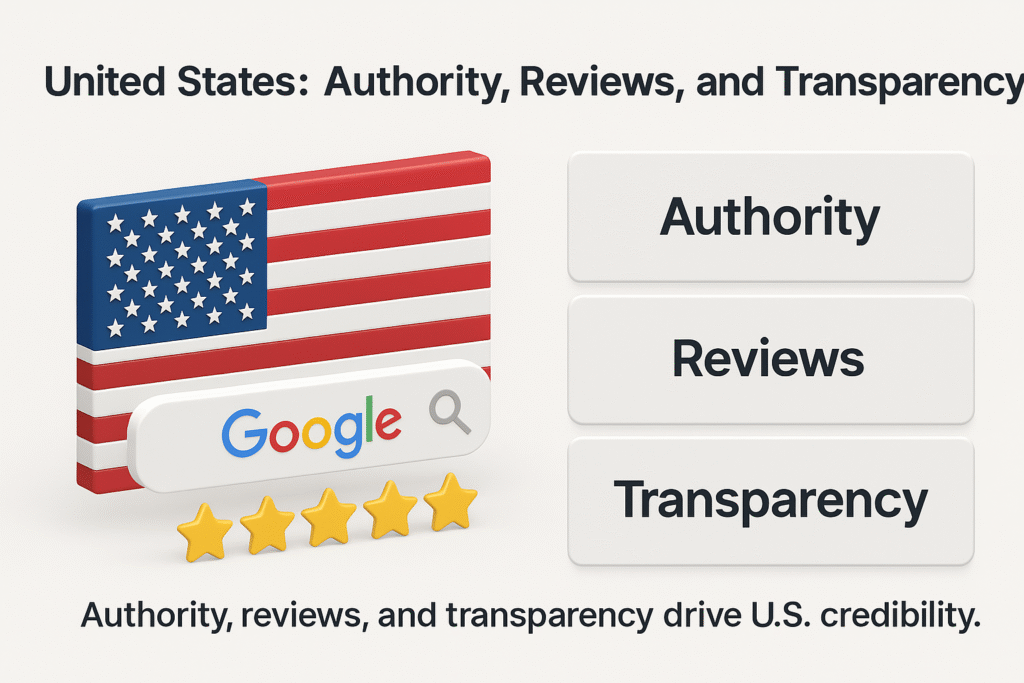
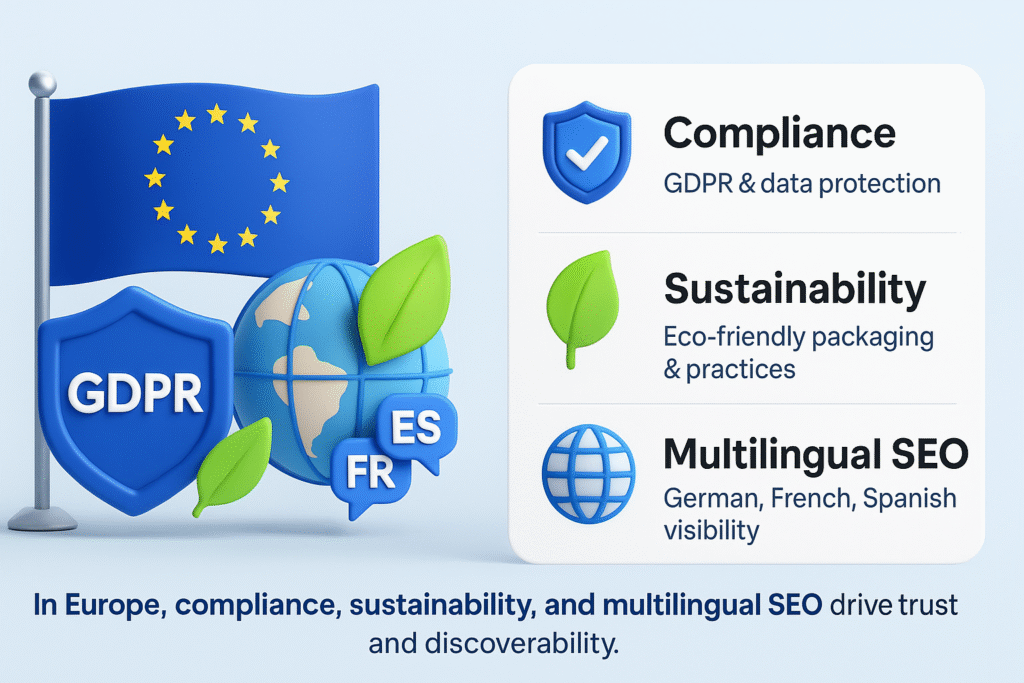
Europe: Compliance, Sustainability, and Multilingual SEO
European audiences place higher emphasis on ethical and sustainable practices. Brands that highlight recyclable packaging, eco-certifications, and transparent supply chains perform better in Korean companies’ international marketing campaigns. GDPR compliance also matters. Without clear data protection practices, European buyers hesitate.
Multilingual SEO is critical. A single English-only site is not enough. German, French, and Spanish landing pages with hreflang tags increase visibility and trust. Structured data ensures Google can present information in local languages.
Sustainability is not just cultural; it’s a ranking advantage. European consumers actively search for keywords tied to “eco-friendly” and “sustainable,” and integrating these phrases into content boosts discoverability.
Southeast Asia: Mobile-First and Marketplace Integration
Southeast Asia is booming as an e-commerce hub, but buyers here are overwhelmingly mobile-first. As of 2025, mobile devices account for about 64% of all global web traffic. This region leans even higher, with the majority of searches and purchases happening on mobile.
That makes fast-loading, mobile-optimized websites essential. Local language content in Thai, Vietnamese, or Bahasa improves both rankings and relevance. Additionally, much of the region’s product discovery happens on Shopee, Lazada, and Tokopedia. For expanding abroad, Korea search optimization, marketplace SEO is just as important as Google rankings. Optimized product descriptions, keywords, and localized visuals drive conversions here.
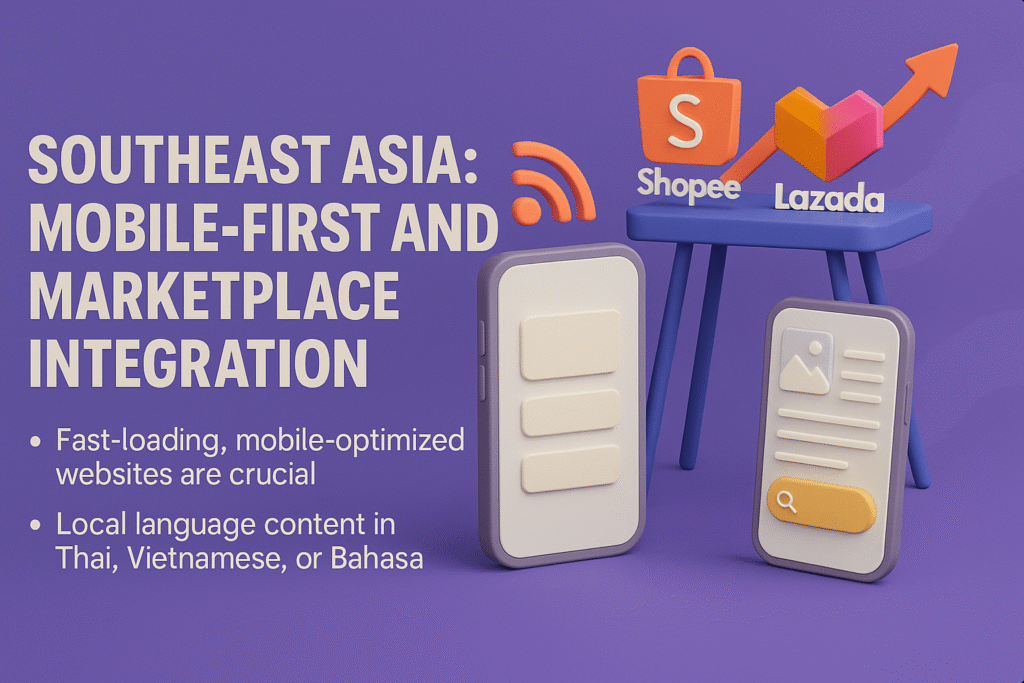
Regional SEO Priorities at a Glance
| Region | Buyer Priorities | 2025 Trends That Matter |
|---|---|---|
| United States | Authority, reviews, transparency | Over 58% of U.S. consumers read 10+ reviews before purchase. |
| Europe | Compliance, sustainability, ethics | By 2025, 42% of European online shoppers prefer eco-certified brands. |
| Southeast Asia | Mobile-first, affordability | E-commerce sales in SEA are expected to hit $175 billion by 2025. |
Why Regional SEO Builds Global Success?
For global SEO Korean brands, adapting by region is the only way to stay competitive. U.S. audiences need proof and authority. Europeans demand sustainability, compliance, and localized languages. Southeast Asians expect fast mobile experiences and marketplace visibility.
By aligning with these regional behaviors, Korean companies ‘ digital marketing strategies move from generic to targeted. This not only boosts rankings but also accelerates trust-building. In 2025, brands that embrace regional SEO strategies will outpace those relying on one-size-fits-all campaigns.
Digital Marketing Channels Beyond SEO
Digital marketing for Korean companies abroad is the fuel that supports visibility once global SEO lays the foundation. While organic search builds trust over time, paid ads, social media, and influencer campaigns can create faster awareness. For South Korean brands expanding internationally, blending these channels with SEO ensures balanced and scalable growth.
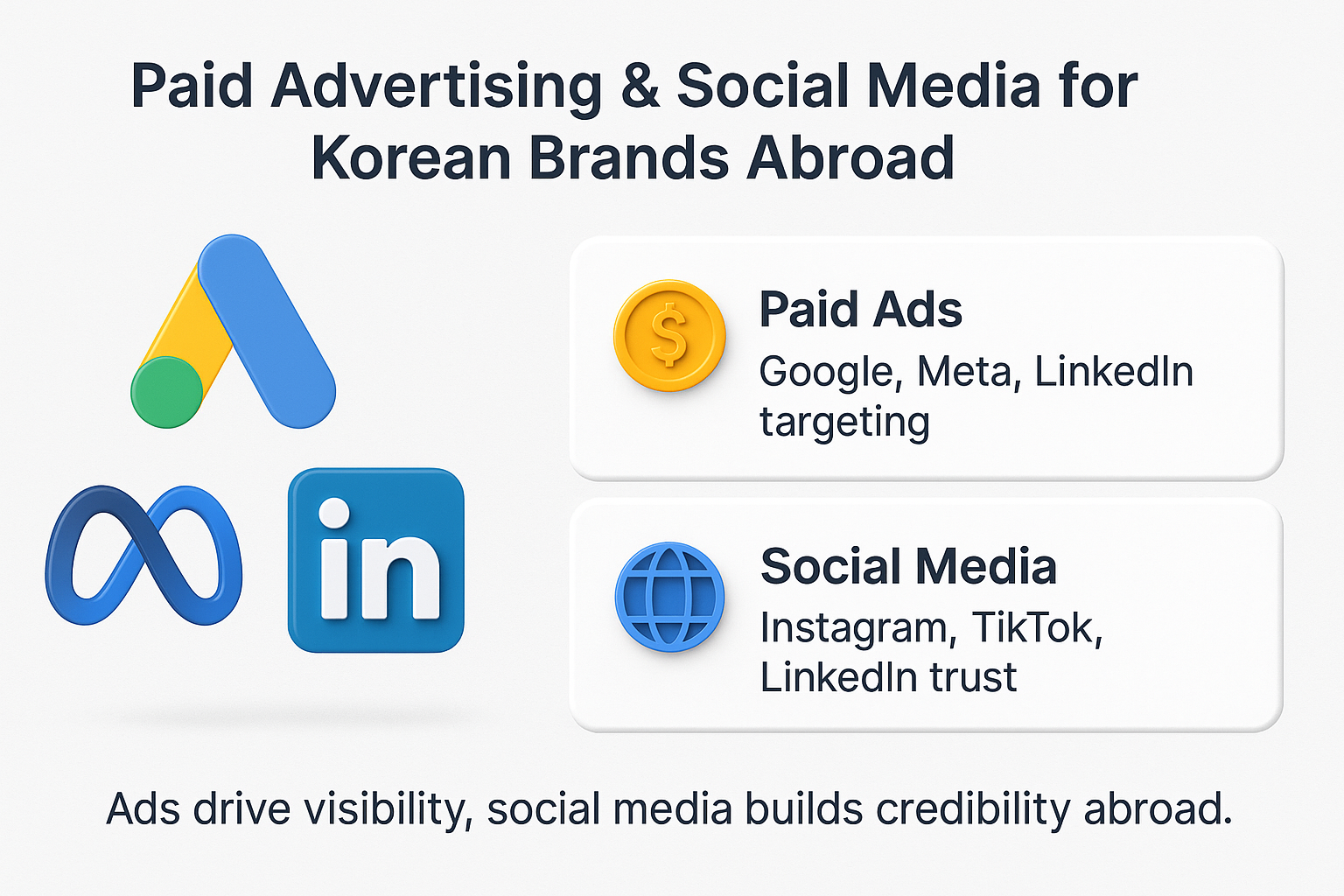
Paid Advertising for Korean Brands Abroad
Paid ads remain one of the fastest ways to reach new audiences. Google Ads allow brands to target search intent directly, while Meta platforms Facebook and Instagram enable precise demographic targeting. LinkedIn Ads also work well for B2B brands, especially in sectors like technology and finance. To expand abroad, Korean digital marketing, paid ads deliver immediate visibility and data that inform future campaigns.
Social Media as a Global Trust Builder
Social platforms are where buyers discover, engage, and evaluate brands. For global marketing Korean brands, Instagram and TikTok are powerful in fashion, beauty, and lifestyle sectors, while LinkedIn drives credibility for professional services and technology. Social media also functions as proof of activity. A brand that posts regularly and engages with comments signals reliability, while one that remains silent risks being overlooked.
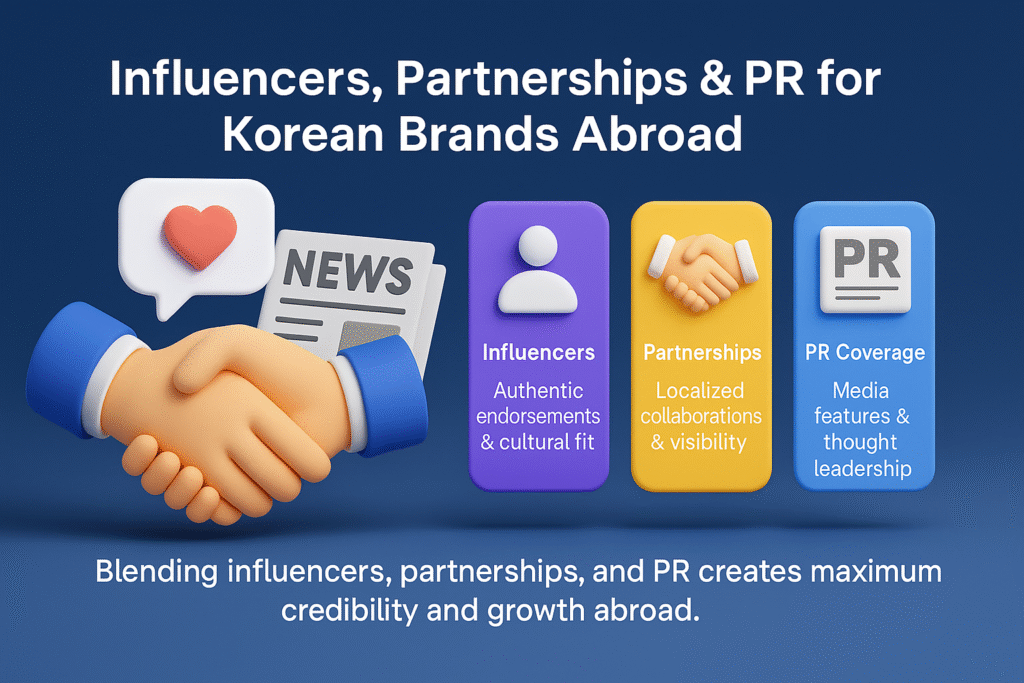
Influencers and Local Partnerships
Influencers bridge the cultural gap between Korean companies and foreign buyers. Western consumers often trust influencers more than traditional ads. By collaborating with creators who resonate with target audiences, Korean brands gain authenticity. These partnerships also generate backlinks and media mentions, reinforcing SEO efforts.
Key advantages of influencer and partnership campaigns include:
Authentic endorsements that reduce buyer hesitation.
Localized content that feels natural to foreign audiences.
Multi-channel visibility that supports long-term credibility.
PR and Media Coverage
Public relations adds another layer of trust. Press releases, interviews, and thought leadership articles in international media outlets demonstrate a brandis seriousness and respect. For advertising channels, Korean companies’ international PR ensures coverage reaches beyond ads and social posts, positioning the brand as an authority.
Blending Channels for Maximum Impact
No single channel works in isolation. For digital marketing for Korean companies abroad, the strongest strategies combine SEO, paid ads, social media, influencers, and PR into one cohesive system. This multi-channel approach allows Korean companies to create visibility quickly, reinforce trust, and scale sustainably.
Evergreen Content for Korean Brands Abroad
Evergreen content for Korean brands abroad is one of the most effective ways to build lasting visibility in international markets. While ads and campaigns fade quickly, evergreen content continues to attract traffic, leads, and trust for months or even years. For South Korean companies expanding abroad, it is a long-term digital investment that compounds over time.
Why Evergreen Content Works Globally?
Evergreen content is information that stays relevant. Guides like “How to Use Korean Skincare for Sensitive Skin” or “Best Practices for Sustainable Electronics in Europe” remain useful long after publishing. For global SEO Korean brands, this type of content captures ongoing search traffic, answers buyer intent, and builds credibility. It signals to Google that the brand consistently delivers value, improving rankings and authority abroad.
Types of Evergreen Content for Korean Companies
To expand abroad Korea content strategy, the best evergreen assets include:
Educational guides and tutorials.
Case studies that highlight success abroad.
Product comparisons that explain value clearly.
FAQ sections addressing customer concerns.
Each of these formats works across industries, from K-beauty and fashion to electronics and B2B services.
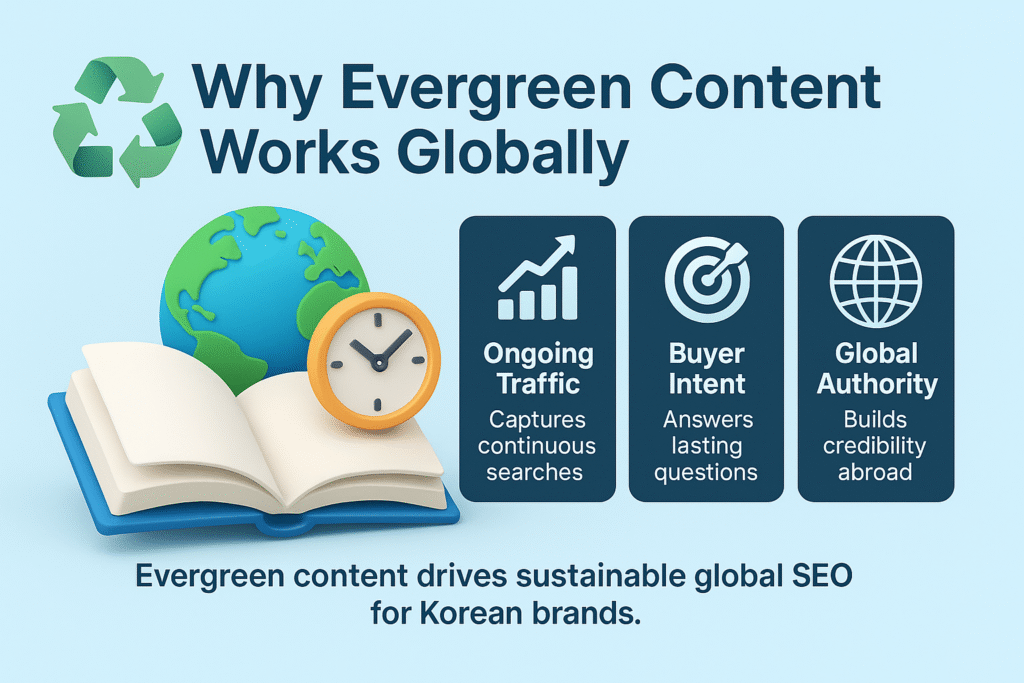
Regional SEO Priorities at a Glance
| Type | Evergreen Example | Non-Evergreen Example | Why It Matters Abroad |
|---|---|---|---|
| Guides | “How Korean Skincare Routines Work” | “Top Skincare Products Summer 2024” | Guides remain relevant, seasonal lists expire quickly |
| Case Studies | “Korean Brand Expansion Success in Europe” | “Our Results From This Month’s Campaign” | Case studies build long-term authority |
| FAQs | “How to Order Korean Products Online” | “Limited-Time Shipping Promo FAQs” | FAQs solve lasting buyer concerns |
Long-Term Benefits of Evergreen Strategies
For long-term digital marketing Korean companies, evergreen content reduces dependence on constant ad spend. Instead of paying to be seen, brands earn traffic organically. This is especially valuable in competitive regions like the U.S. and Europe, where paid clicks can be expensive.
When refreshed occasionally with new data or trends, evergreen content continues to perform. It supports backlink generation, provides material for social sharing, and positions the brand as a reliable resource in international markets.
In 2025, evergreen content for Korean brands abroad is not just a content tactic – it is a foundation. It ensures that Korean companies remain visible, trusted, and competitive long after campaigns end.
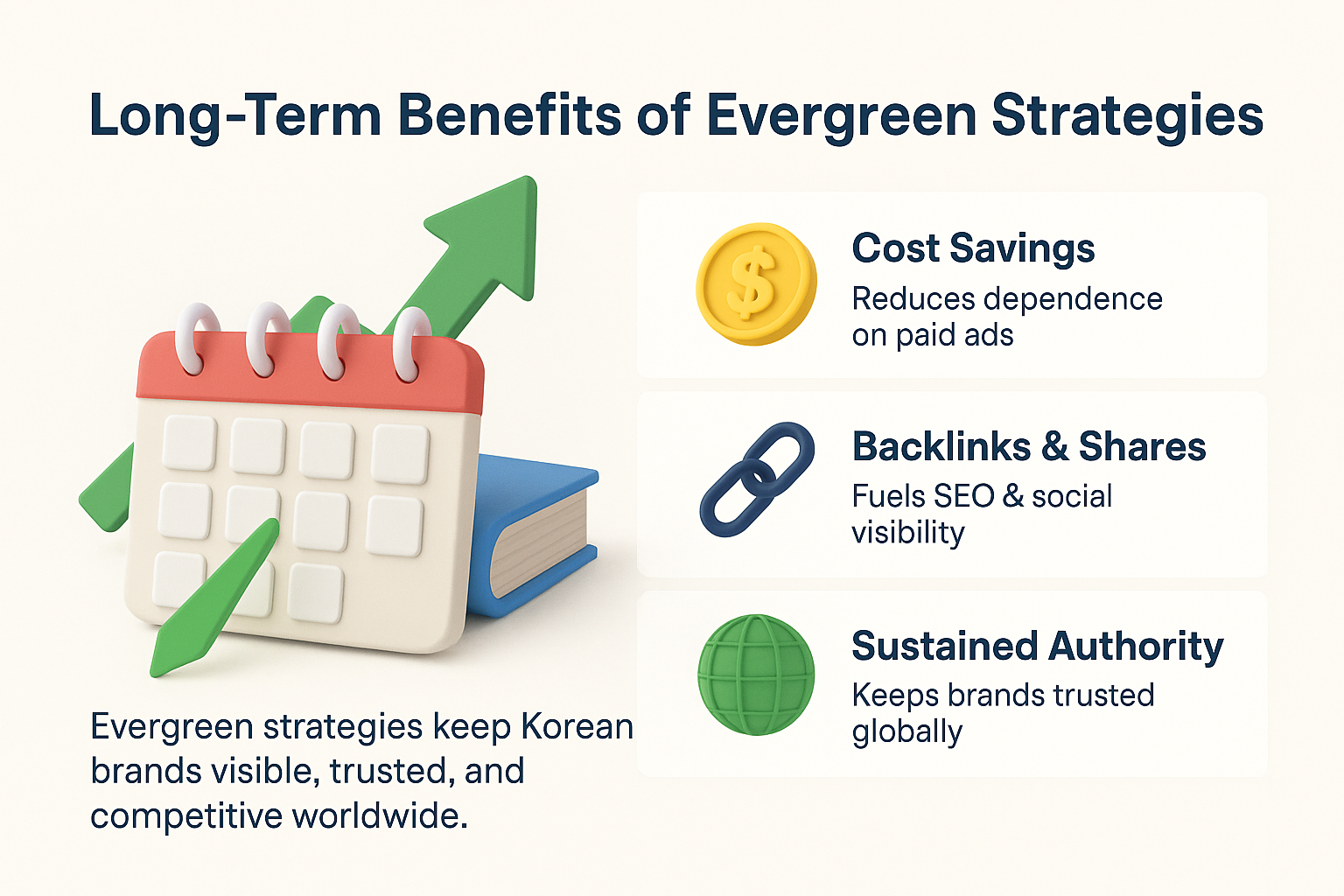
Integration of AI in Global SEO for Korean Brands
AI tools for Korean brands’ global SEO are reshaping how companies expand abroad in 2025. While traditional optimization methods still matter, artificial intelligence now powers faster research, more innovative content strategies, and better personalization. For South Korean businesses, using AI isn’t a trend – it is a way to compete with established global players.
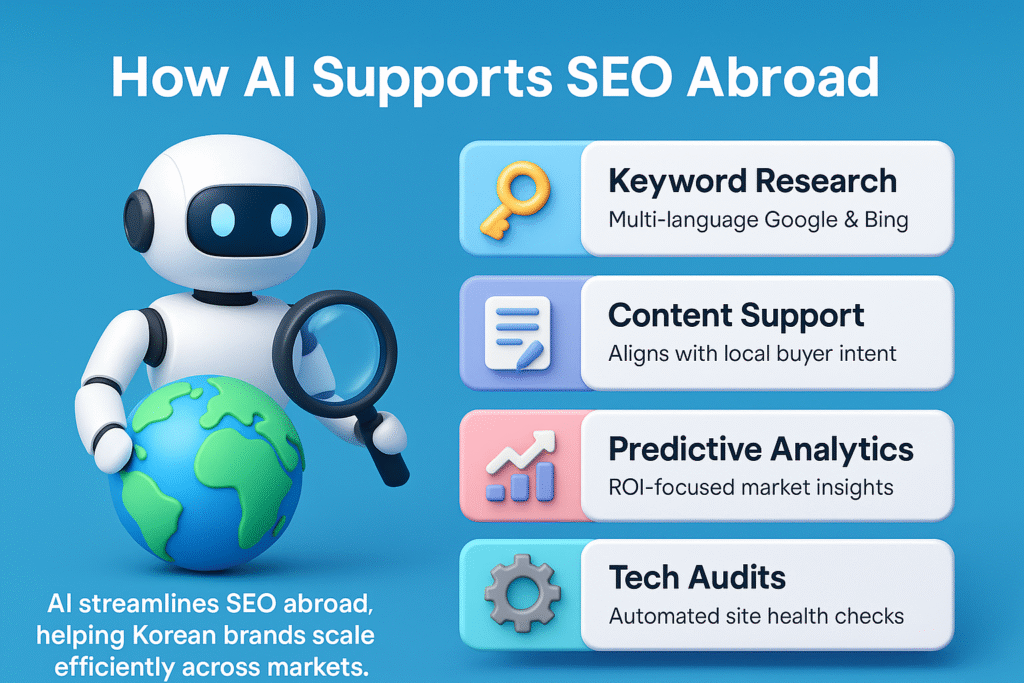
How AI Supports SEO Abroad?
For AI SEO Korean companies abroad, the biggest advantage is efficiency. Instead of spending weeks on manual keyword research or content planning, AI platforms analyze markets instantly. They uncover regional search trends, user intent, and competitor weaknesses, giving Korean brands data-driven insights that fit each target market.
Practical uses of AI in global SEO automation include:
Keyword research tailored to Google and Bing across multiple languages.
Content generation support that aligns with buyer intent in local markets.
Predictive analytics showing which markets hold the highest ROI potential.
Automated technical audits to detect site issues quickly.
These tools allow companies to focus less on manual tasks and more on strategic execution.
Why AI Matters for Korean Companies Expanding Abroad?
For expand abroad Korea digital marketing with AI, the real strength lies in personalization. AI-driven platforms can adapt messaging for different regions, ensuring tone, keywords, and cultural context match buyer expectations. For example, AI can recommend content that highlights eco-certifications in Europe while focusing on affordability in Southeast Asia.
AI also improves performance tracking. Instead of waiting for monthly reports, Korean companies can use AI dashboards to monitor SEO campaigns in real time, adjusting budgets and content instantly. This agility helps new entrants compete against established Western brands.
In 2025, AI tools for Korean brands’ global SEO will be non-negotiable. They are the bridge that allows South Korean businesses to enter international markets with speed, precision, and confidence.
Common SEO Mistakes Korean Brands Make in Global Expansion
SEO mistakes Korean brands global expansion strategies often fail not because products are weak, but because companies overlook how global search ecosystems truly work. Naver-focused tactics don’t translate to Google or Bing, and small oversights can create large setbacks when expanding abroad.
Here are the most common errors Korean companies face when shifting to international SEO:
Over-reliance on Naver strategies – Domestic SEO depends on blogs, portals, and paid placements. Abroad, those signals don’t matter. Without adapting to Google’s ranking factors, global SEO Korean brands remain invisible.
Ignoring local content needs – Many companies launch only English sites, assuming it is enough. In Europe or Southeast Asia, expand abroad Korea SEO strategy must include localized languages and cultural keywords.
Neglecting online reviews – Western buyers depend on Trustpilot, Google Reviews, or Amazon ratings. Without visible testimonials, Korean companies digital marketing abroad appears incomplete and less trustworthy.
Weak reputation management – Brands often forget that news, social mentions, and influencer opinions impact SEO. Negative press spreads fast, and without international reputation management, rankings and credibility suffer.
Focusing only on ads, not SEO – Paid ads create short bursts of traffic, but they don’t replace organic growth. Without SEO, long-term visibility abroad remains unstable.
For Korean companies, avoiding these mistakes saves time, budget, and credibility. By recognizing them early, businesses can build stronger foundations for lasting international growth.
Measuring Performance and Scaling for Korean Companies Abroad
Measuring performance for Korean companies abroad is what turns digital marketing into a repeatable system. Without tracking, global expansion becomes guesswork. With clear KPIs, businesses know what drives growth.
For scaling South Korean companies internationally, the most important metrics include website traffic, conversion rates, customer reviews, and ROI. These signals reveal visibility, trust, and financial sustainability. Tools like Google Analytics 4, SEMrush, and Brandwatch help companies gather reliable data across regions.
Key metrics to track:
Website traffic from target countries
Conversions from paid ads or SEO
Review scores and online mentions
Return on investment (ROI)
When KPIs show consistent success, Korean brands can safely expand into new markets, scale ad spend, and strengthen partnerships. In 2025, performance tracking for Korean businesses ensures growth is data-driven, sustainable, and globally competitive.
Case Study: Korean Brand Global Expansion Through SEO and Digital Marketing
Case study Korean brand global expansion shows how the right mix of SEO and digital marketing can transform visibility abroad. This example highlights a mid-sized Korean skincare company that successfully entered Europe and the United States in 2024 by shifting from Naver strategies to Google-first methods.
The Challenge
In Korea, the brand ranked highly on Naver thanks to blogs and portal visibility. But when attempting to expand into Europe, it became almost invisible online. Sales through distributors were inconsistent, and customers in France and Germany struggled to find information. Without reviews or localized content, the brand lacked credibility. For this expanded abroad Korea strategy, adapting digital presence became urgent.
The Strategy
The company partnered with a digital agency to build a global SEO Korean brands roadmap. Technical SEO was improved with a mobile-first design and structured data. Content was localized into English, French, and German, using keywords tied to sustainability and vegan skincare, two major European trends.
At the same time, the brand launched digital marketing for Korean companies abroad through a multi-channel campaign. Paid Google Ads targeted high-intent searches like “eco-friendly Korean skincare.” Instagram influencer partnerships generated reviews and backlinks. PR coverage in French beauty magazines added another layer of credibility.
The Results
Within six months, organic search traffic from Europe grew by 180%. Conversions from localized landing pages doubled. Reviews on Trustpilot and Amazon improved average ratings to 4.7/5, boosting buyer confidence. Influencer content drove 25,000 new followers on Instagram, creating a community that engaged with the brand.
For the U.S. market, Google rankings for terms like “vegan Korean moisturizer” placed the brand in the top three results. Sales from direct-to-consumer channels tripled. The combination of global SEO strategy and digital marketing channels turned the company from an overlooked newcomer into a trusted international competitor.
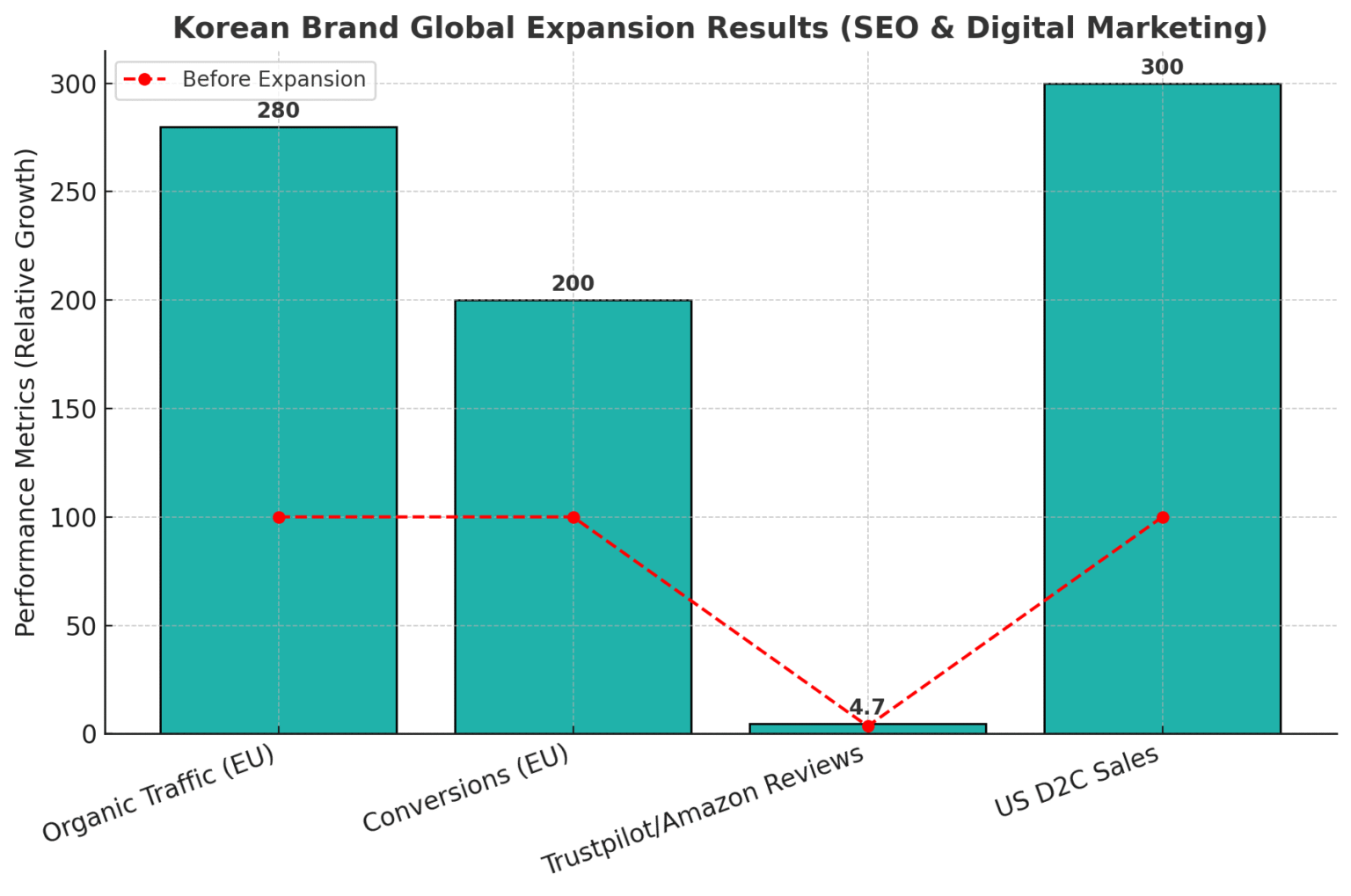
How aboveA Helps Korean Companies Expand Globally?
aboveA helps Korean companies expand globally by guiding them through every stage of international growth. For many South Korean businesses, moving beyond Naver into Google, Bing, and other platforms feels overwhelming. aboveA makes that transition clear, structured, and effective.
The agency specializes in global SEO for Korean brands, ensuring they rank on international search engines and appear where global buyers are searching. Beyond visibility, aboveA strengthens credibility through PR campaigns, influencer partnerships, and review strategies that prove reliability in competitive markets. For digital marketing for Korean companies abroad, aboveA builds multi-channel systems that blend SEO, paid advertising, social media, and localized content. This approach allows Korean brands to be discovered, trusted, and chosen in foreign markets.
Whether it’s helping a startup run lean international campaigns or supporting a large company with scalable solutions, aboveA delivers practical strategies. By combining data-driven insights with cultural adaptation, the agency turns global expansion into measurable results. In 2025, South Korean businesses partnering with aboveA will not only expand abroad but also compete confidently on the world stage.
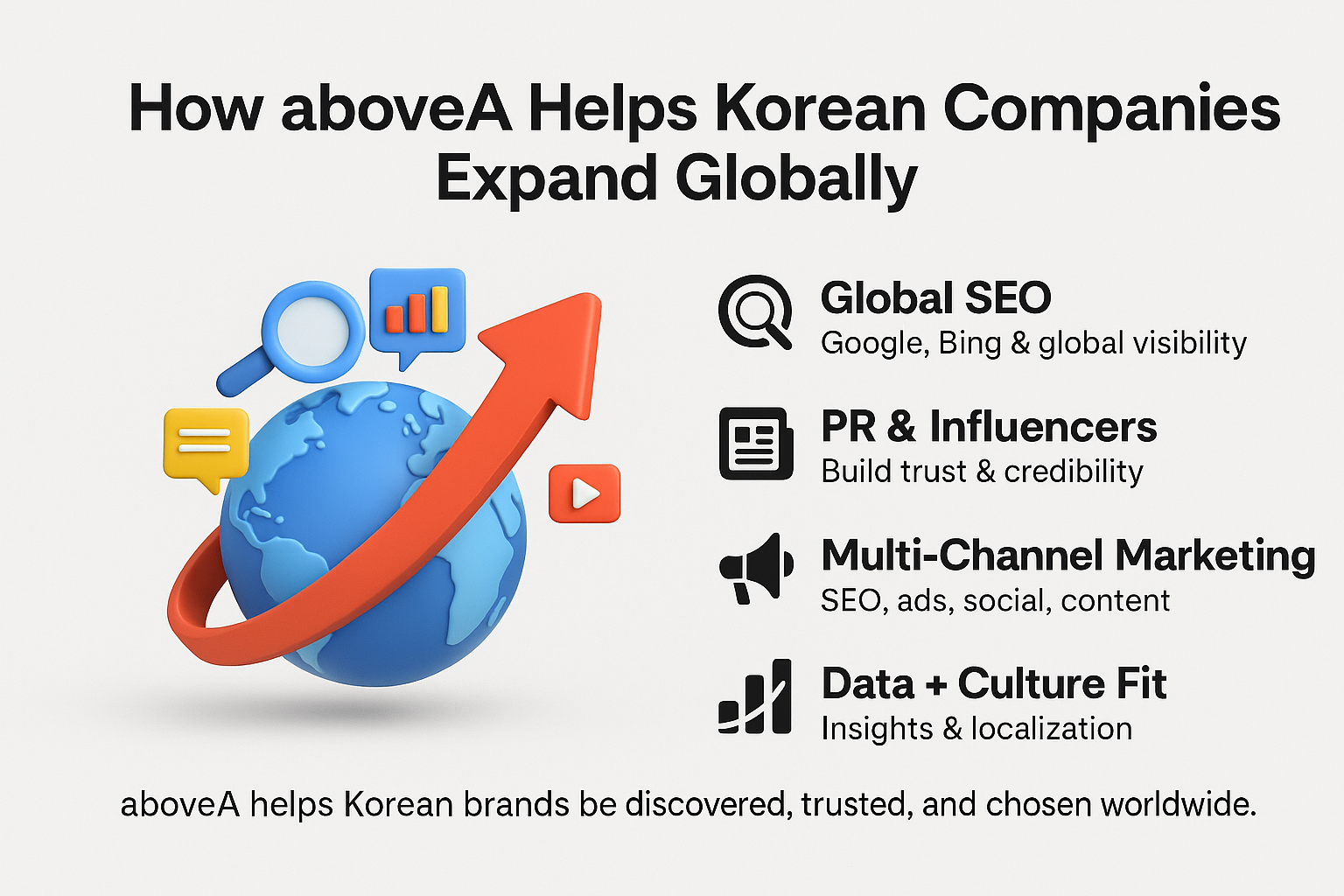
Conclusion: SEO and Digital Marketing for Korean Companies Abroad
SEO and digital marketing for Korean companies abroad are no longer optional; they are the backbone of successful expansion in 2025. Strategies built for Naver don’t work outside Korea, where Google, Bing, and global platforms dominate. By investing in international SEO, creating a strong digital presence, and leveraging channels such as paid ads, PR, and influencers, Korean brands can gain visibility and trust worldwide. Performance tracking ensures growth is data-driven, not guesswork. With the right expansion abroad Korea strategy, businesses can transform ambition into measurable success and thrive as global competitors.
Frequently Asked Questions
1. Why doesn’t Naver SEO work for Korean companies abroad?
Naver SEO depends on Korea’s portal system. Outside Korea, Google and Bing dominate, requiring technical SEO, backlinks, and localized content to gain visibility and trust.
2. How can global SEO help Korean brands expand internationally?
Global SEO ensures Korean brands appear in Google searches, building visibility, credibility, and organic traffic. It creates long-term growth that supports digital marketing and international sales channels.
3. What digital marketing channels work best abroad for Korean companies?
The strongest mix combines paid Google Ads, social media campaigns, PR coverage, and influencer partnerships. Together, these channels build awareness, trust, and customer engagement internationally.
4. What KPIs should Korean companies track when expanding abroad?
Key KPIs include website traffic, conversions, review scores, and ROI. Monitoring these metrics ensures global strategies are effective, sustainable, and aligned with business growth goals.

